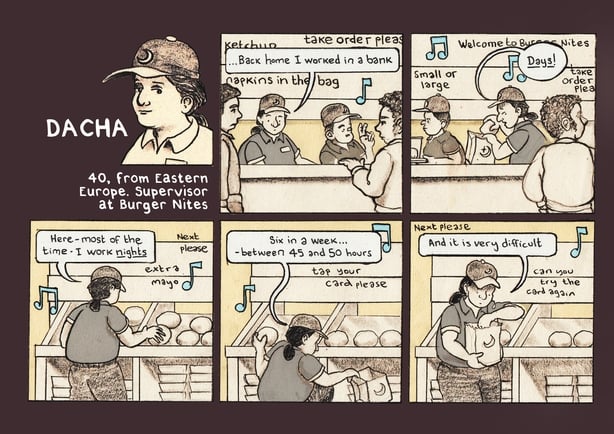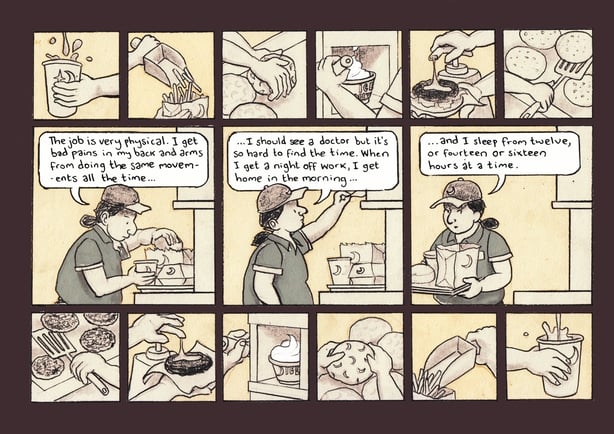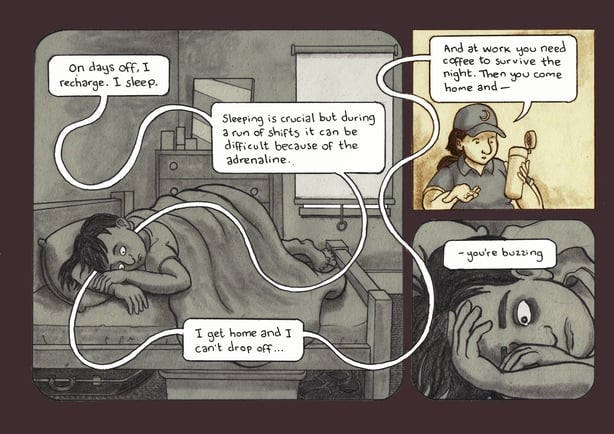Analysis: they play an important role in Ireland's food, accommodation and entertainment industries, but are undervalued and underpaid
Women migrant nightworkers in food, accommodation and entertainment industries perform fundamental forms of work. Yet, they are invisible in plain sight, undervalued and underpaid. What does that tell us about the current state of nightwork in Ireland?
Meet Eleonora. She is a 32-year-old woman, a former primary school teacher in South America, who moved to Ireland just over a year ago. She is working the nightshift as a security woman subcontracted to a fast-food chain.
Imagine that you finished a stressful nightshift at 4am and get home at 5 to sleep. After six hours of daysleep, you're off to English language classes for three to four hours. You rush back home to cook and eat before you’re on the bus again, commuting for another noisy nightshift. You do the 'graveyard’ shift because it pays a couple of euros more than on days. Even so, tiredness never goes away.

On top of this, you find out that you get paid less than any male co-worker, just because you are female. "Employers pay differently if you’re a man or a woman – or a migrant, and I tick them all – I am a migrant, woman, working at night on poverty-low rates", says Eleonora.
Where do Ireland's migrants come from?
Many of the people who smile at you in shops, halls or on your doorsteps are, like Eleonora, migrants, from all over the world. Year on year, British and Romanian nationals have been in the lead with Brazilian migrants being the third highest group of migrants issued with PPS numbers since 2018.
Where do migrants mostly work in Ireland?
The Irish labour market benefits greatly from the influx of migrants working in the food and accommodation services. 82,635 foreign born workers of the total 123,135 PPS numbers issued work in these two industries alone. In 2018, 53.8% were men and 46.2% were women.
We need your consent to load this rte-player contentWe use rte-player to manage extra content that can set cookies on your device and collect data about your activity. Please review their details and accept them to load the content.Manage Preferences
From RTÉ Archives, John Kilraine reports for RTÉ News in 2003 about how the situation for migrant workers in Ireland is getting worse
One third of migrant workers work in fast-food venues and takeaways, as outsourced security staff, kitchen assistants or food couriers contracted by digital platforms. Another third are hospitality workers (e.g., cleaners). Accommodation, alongside food and beverage sectors, falls under travel and tourism, and is a major economic contributor in many European societies. EU-wide, the food, beverage sectors and sub-sectors provide yearly a total revenue of €230,5 million.
The South American and Central and Eastern European women migrant nightworkers that I have met travel to Ireland and end up working in the travel and tourism industry. Some of the documented women with whom I spoke in Dublin and Cork are on student visas where they are only permitted to work up to a maximum of 20 hours per week, and can hardly pay the rent. The current system forces them to work extra 20 to 30 hours.
The EU citizens I encountered, migrants from Romania and Czech Republic, had the right to work, but had limited English language skills. These women worked mainly as cleaners in hotels or offices at night. Safety was one of their main concerns. They also spoke about a work schedule that kept them away from spending time with families and friends.

How do migrant workers fare in Ireland?
Abundant research shows that migrant workers fare badly on the Irish labour market. Non-Irish and non-white people face many issues in accessing the Irish labour market. Research from Pavee Point and Maynooth University shows you are five times more likely to experience discrimination while looking for work if you are a Roma, black or non-Irish. AkiDwA, a migrant organisation for women, found that migrant women living in direct provision in Ireland face many barriers in securing employment, even when under international protection and with the right to work.
When employed, as I found in my research, they often face injustices. A fast-food female manager, also from South America, says: "We tried to hire more Irish. They don’t stay. If they think they should be going travelling, they go. Immigrants, on the other hand, they need to pay school fees. It’s costly. Also paying for visa. And you can’t just go home for a weekend. Return flights are €1,200. So, I need to go less and stay for longer – 3 weeks. But the Irish fella who asked to have his place kept, he went to Asia. We decided to keep his job. I’m jealous".
Discrimination in the workplace is reported by 8.5% of White Non-Irish, 10% of Asian ethnics, and 13.8% of Black/Other ethnicity. Some 7% of employed women experience more discrimination in the workplace then men (4.1 %), as reported in this joint research.
We need your consent to load this rte-player contentWe use rte-player to manage extra content that can set cookies on your device and collect data about your activity. Please review their details and accept them to load the content.Manage Preferences
From RTÉ Radio 1's Morning Ireland, non-EU workers living in Ireland have to pay significantly more for residence permits
Research by Migrant Rights Centre Ireland shows that migrants in the meat sector are worked to the bone, while trapped in low pay jobs and in underemployment (working at a level below their skills). In sum, these reports indicate higher levels of perceived discrimination in the workplace towards women, groups other than White Irish, those whose religion is categorised as 'Other' and those with a disability.
Why are these women missing from research and public debates in Ireland?
Caroline Criado Perez reports on RTÉ Radio 1 that the big data gap makes women unseen in today's societies. She argues that the world is designed by men and for men and , accordingly, If you only study half of the world, then you cannot understand it as a whole. Insightful research, but it says little if none about experiences of women migrant nightworkers in Ireland. There's next to no data on this cohort in Ireland or elsewhere.
As my previous research on invisible migrant nightworkers in 24/7 London shows, daytime researchers find it hard to reach out to nightworkers who live on opposite rhythms to daytime people. If you only study daytime folk, you cannot understand what goes on at night - and you grasp even less about the multi-layered precarity experienced by women migrant nightworkers in Ireland, in a heavily masculinised nightwork environment. There is little concern shown in this area, even from the mooted Night Culture Mayors.

If migrants are welcome for the economic benefits they bring to this country, they should not be rejected as migrants and discriminated as 'others’. Instead, they ask for decent working conditions, a living wage, the right to be seen and to be treated respectfully while on the job.
In thriving cities like Dublin and Cork, tourists, local businesses and institutions benefit from the vibrant nightlife, culture events and eating out. The nighttime economy relies heavily on migrants doing the 'graveyard shift' in food services and accommodation sectors, but women migrant nightworkers such as Eleonora, fall out of their remit. The realities of workers in precarious employment’ are not their concern.
Artwork by Lindsay Pollock via PositiveNegatives
This research is supported by PRECNIGHTS, a project that explores precarity amongst women migrant nightworkers in Ireland and is funded under Marie Skłodowska-Curie Actions (MSCA) Grant №: 101063938.
The views expressed here are those of the author and do not represent or reflect the views of RTÉ


